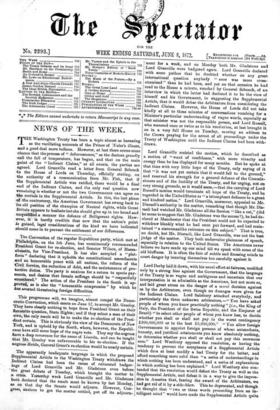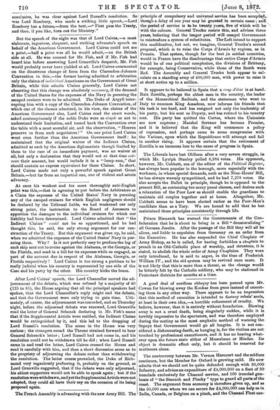Lord Derby laid it down, with his usual effort at
fairness, modified only by a strong bias against the Government, that the language ef the Treaty is so vague and ambiguous and uncertain that our interpretation is as admissible as the American, but not more so, and laid great stress on the danger of a moral decision against us by the Arbitrators, even though no damages were given for the Indirect Claims. Lord Salisbury attacked everybody, and particularly the three unknown arbitrators,—" You have asked people of whom you know practically nothing" (i.e., the King of Italy, the President of the Swiss Republic, and the Emperor of Brazil) "to select other people of whom you know less, to decide whether you shall or shall not pay in the worst contingency £200,000,000 or in the best £6,000,000." "You allow foreign Governments to appoint foreign persons of whose antecedents, honesty, and juridical attainments you know absolutely nothing, to determine whether you shall or shall not pay this enormous sum." Lord Westbury opposed the resolution, as having the tendency to prevent the acceptance of a Supplemental Article which does at least modify a bad Treaty for the better, and afford something more solid than "a series of understandings in which nothing has been understood, and a series of explanations in which nothing has been explained." Lord Westbury also con- tended that the resolution would defeat the Treaty as well as the Supplemental Article, and defeat it in a way to give the impres- sion in America that, fearing the award of the Arbitrators, we had got rid of it by a side-blow. This he deprecated, and though he thought that "two or three words proceeding from an in- telligent mind" would have made the Supplemental Article quite
conclusive, he was clear against Lord Russell's resolution. So was Lord Rosebery, who made a striking little speech,—Lord Rosebery has a future,—from the text,—" First pass the Treaty, and then, if you like, turn out the Ministry."



































